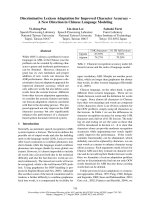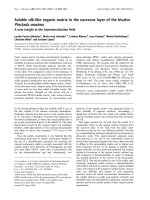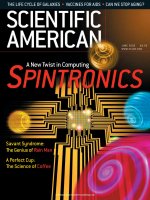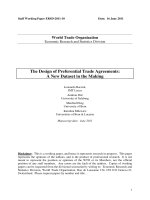5 4 2 a new girl in class TG
Bạn đang xem bản rút gọn của tài liệu. Xem và tải ngay bản đầy đủ của tài liệu tại đây (118.55 KB, 4 trang )
5.4.2
A New Girl in Class
This is a fictional story about two
friends who help organize a walk-a-thon to
raise money for further research on muscular
disorders. They get the idea for the walk-athon when they find out that a girl with cerebral palsy will be a new student at the school.
SUMMARY
GENERALIZE
PREDICT
READ THE BOOK
Ask students to set a purpose
for reading this book. Draw out their curiosity
in the illustrations and in the discussion of
muscular disorders and handicapped people.
SET PURPOSE
Have students
write down predictions every time they are
about to turn the page. Every prediction
should be justified by their prior knowledge, by
clues they find in the text, and by their sense
of logic. If their prediction doesn’t match the
story as they read on, they should refine their
predictions based on the new information.
STRATEGY SUPPORT: PREDICT
LESSON VOCABULARY
abdomen
gait
therapist
artificial
handicapped
wheelchair
INTRODUCE THE BOOK
Discuss with
students the title and the author of A New Girl
in Class. Based on the title, ask students what
kind of information they think this book will
provide. Draw students’ attention to the cover
illustration and elicit questions about the girl
with crutches. Ask them what the title and the
illustration tell them about what they will be
reading in the book.
INTRODUCE THE TITLE AND AUTHOR
BUILD BACKGROUND Ask
students if any of them
ever volunteered for a fundraiser? If so, what
cause did it benefit? What types of activity did
they do to raise money? Ask them if they know
how the money raised helped the cause?
Have students study the illustrations.
Ask them what they think is going on in the
illustrations. Ask students if any of them have
seen a scene similar to the illustration of the
girl on the parallel rails on page 10, and if so,
do they know what she is doing and why.
PREVIEW
Have students discuss in English what
they see in the illustrations. Elicit responses
specifically referring to crutches, handicaps,
and therapy. Encourage them to use their new
vocabulary words to discuss handicaps. Have
them share equivalent words from their home
language regarding handicaps.
76
COMPREHENSION QUESTIONS
Why does Mr. Porter tell the class
about cerebral palsy? (because Lisa, the new
student, has it)
PAGES 3–6
What is cerebral palsy? (a condition
that prevents a person from developing motor
skills properly)
PAGE 4
Which sentence is a generalization?
(“In general, some scientists believe it’s the
result of not enough oxygen getting to the brain
in the early stages of development.”)
PAGE 6
What did the students decide to
do to help kids like Lisa? (Possible responses: to
raise money for research, sponsor a walk-a-thon)
PAGES 12–13
How did Karen and Dave recruit
walkers? (They divided the class into teams,
one team for each grade. Then each team
would meet with students to recruit walkers.)
PAGE 17
A New Girl in Class
16911_LRD_TG_076-077 76
10/20/05 10:24:13 AM
REVISIT THE BOOK
READER RESPONSE
1. Possible responses: [Details] Muscular disorders result in trouble with motor skills,
they can improve with time, physical therapy can help. [Generalizations] Muscular
disorders bring many challenges; these circumstances can often be improved.
2. Possible responses: A large amount of
money will go to cerebral palsy research;
Lisa may feel good about attending this
school.
3. Abdomen means stomach; stomach, belly.
4. Possible responses: Premature birth may
have led to her brain not getting enough
oxygen for normal development.
EXTEND UNDERSTANDING Ask students to write
the elements of plot structure—background,
goal, rising action, climax, and outcome—
down one side of the page, leaving a couple
of lines between each word. Then, ask students to identify each of the elements in the
text. (background: information the students
receive about Lisa and cerebral palsy; goal:
sponsoring a walk-a-thon; rising action: preparation for the event; climax: the walk itself;
outcome: walk-a-thon is a success)
RESPONSE OPTIONS
Have students pretend that they are
organizing a walk-a-thon for someone like Lisa.
Ask them to create a poster that encourages
other students to participate in the walk-athon. Suggest that their posters both inform
other students about cerebral palsy and
inspire them to participate.
WRITING
SCIENCE CONNECTION
Come up with a list of several
other muscular disorders. Then,
divide students into groups of four or
five. Have students do further research
on the causes of, effects of, and interesting
facts about these muscular disorders. Then,
the students should compile their information
into three columns—Causes, Effects,
Interesting Facts—then present their
information to the class.
Skill Work
TEACH/REVIEW VOCABULARY
Review the vocabulary words and definitions
with students. Use the illustrations in the
book to discuss handicapped, therapist, and
abdomen. Have the students use the rest
of the words in sentences. Ask them to try
to use more than one vocabulary word in a
single sentence.
TARGET SKILL AND STRATEGY
Remind students that a generalization is a broad statement that applies
to many examples. Explain that an author’s
generalizations often sum up information
in a story. Stress that there are clue words
that can signal generalizations, and offer
these words as examples: often, usually,
and in general. Encourage them to note
these words as they read.
GENERALIZE
Explain to students that to predict means to tell what you think might happen in a story based on what has already
happened. Explain that students should look
for clues in the text and use prior knowledge
and logic to make their predictions. As they
read, they should monitor their predictions
to see if they match the text. If not, they
should refine their predictions in light of new
information.
PREDICT
ADDITIONAL SKILL INSTRUCTION
Explain to students that the plot is an
organized pattern of events. Encourage students to use story maps to recognize the
elements of plot: background, goal, rising
action, climax, and outcome. Introduce the
terms flashback, in which the action of the
story is interrupted to talk about something
that happened in the past, and foreshadowing, in which the writer hints at events to
come in the story. Encourage students to
look for these elements as they read.
PLOT
A New Girl in Class
16911_LRD_TG_076-077 77
77
10/20/05 10:24:14 AM
A New Girl in Class
Name
Generalize
A generalization is made after thinking about a number of examples or facts and identifying what
they have in common.
Directions Read this information about cerebral palsy.
Cerebral Palsy is a condition that a person is sometimes born with. It prevents the person
from developing motor skills properly. Babies born with cerebral palsy often have a hard
time learning to roll over, sit up, stand, or walk. They can develop these skills, but it takes
them much longer than usual—sometimes many years.
They usually need a lot of physical therapy to learn to control and develop their muscles.
Sometimes kids with cerebral palsy are helped by wearing braces.
Directions Use the information in the passage to fill out the graphic organizer. You may find several
generalizations, but try to identify the main generalization and three of the supporting details.
Generalization
© Pearson Education 5
Supporting Facts
78
16911_LRD_TG_078-079 1
10/20/05 10:24:51 AM
A New Girl in Class
Name
Vocabulary
Directions Draw a line from each word to its definition.
Check the Words You Know
abdomen
handicapped
artificial
therapist
gait
wheelchair
1. abdomen
a particular way of walking, stepping, or
running
2. artificial
produced by humans, not nature
3. gait
a specialist who provides treatment or
healing of an illness or disability
4. handicapped
a chair equipped with large wheels for the
use of a disabled person
5. therapist
the section of the body that holds the intestines and stomach; the belly
6. wheelchair
people who have a mental or physical disability
© Pearson Education 5
Directions Write a paragraph about what you learned about Lisa using four of the vocabulary words.
79
16911_LRD_TG_078-079 79
3/20/06 8:51:51 AM









